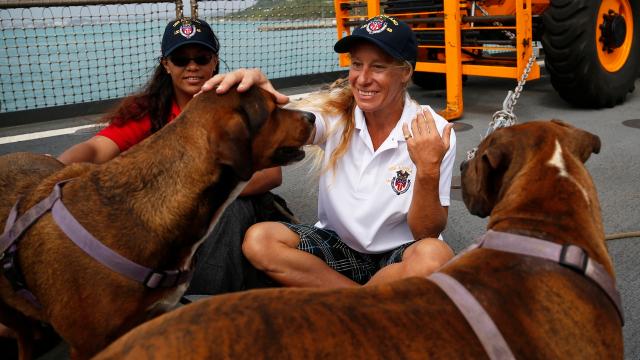The story of two women who were stranded at sea for fie months in shark-infested waters seemed almost too cinematic to be true. And now some experts are questioning the veracity of some of their claims.
Jennifer Appel, right, and Tasha Fuiava sit with their dogs on the deck of the USS Ashland Monday, 30 October 2017, at White Beach Naval Facility in Okinawa, Japan. (AP Photo/Koji Ueda)
Jennifer Appel, Tasha Fuiava and their two dogs left their home state of Hawaii on a voyage to Tahiti back on May 3. After being stranded for what they say was months, the women were spotted last week by a Taiwanese fishing vessel roughly 1450km southeast of Japan and the Navy’s USS Ashland ship was deployed to save them.
The women were incredibly grateful for being picked up and the US Navy confirmed that their boat wasn’t fit to sail, but other questions started to arise, such as why they didn’t use an emergency beacon to call for help.
The Associated Press looked into it, and confirmed that the two had an Emergency Position Indicating Radio Beacon (EPIRB) aboard but never turned it on. According to the women, they felt that they weren’t in any immediate danger that would necessitate sending out an emergency signal.
“We asked why during this course of time did they not activate the EPIRB. She had stated they never felt like they were truly in distress, like in a 24-hour period they were going to die,” US Coast Guard spokesperson Tara Molle told the Associated Press.
Another claim made by the women was that they experienced a three-day storm that reached winds in excess of 97km/h. But the National Weather Service in Honolulu says that no such storm occurred and NASA weather images don’t show anything like that. Such a storm would be incredibly rare in that part of the world in May.
And then there’s the claim of vicious sharks in the area, which Appel said were teaching their young to hunt.
“They came by to slap their tails and tell us we needed to move along,” Appel said on a phone call with reporters immediately after they were rescued. “They decided to use our vessel to teach their children how to hunt. They attacked at night.”
But experts don’t believe it.
“It sounds like something a 4-year-old would tell you,” George Burgess, a shark expert at the Florida Museum of Natural History told the New York Times. “No. No, no and no and no. There’s not an iota of accuracy relative to our knowledge of the shark in any of that.”
“The only one that fits that pattern was the star of the movie Jaws,” he said.
One thing that keeps coming up that would chalk up some of these inconsistencies to ignorance rather than malice or a possible hoax is just how green the women were. Fuiava had never sailed before and Appel copped to her own relative inexperience in difficult sailing conditions in a video made after they were rescued.
When you watch the video of the women aboard the USS Ashland they seem both sincere and relieved that they were saved. But people who doubt their story will certainly raise their eyebrows about one comment made by Appel.
“I was joking with someone about 10 years ago, and they said, ‘What happens when you go out to sea and you get broken?’ and I said, ‘Well, the Navy will come and save me.’ No lie,” Appel said. “It really happened.”
